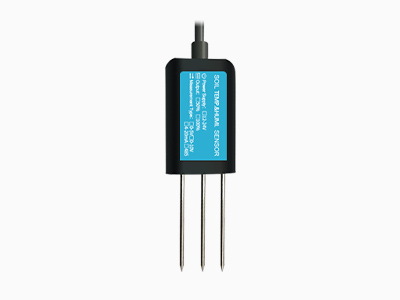With the advent of smart soil moisture sensor, farmers now have a revolutionary tool at their disposal. This article explores the significance of smart soil moisture sensors, their functionalities, benefits, and their role in transforming agricultural irrigation practices.
Importance of Smart Soil Moisture Sensors:

Smart soil moisture sensors play a vital role in optimizing irrigation practices by providing real-time and accurate information about soil moisture levels. With this data, farmers can make informed decisions regarding irrigation timing, frequency, and water application rates. By ensuring that crops receive the appropriate amount of water at the right time, these sensors significantly improve water management efficiency and enhance crop health.
Functionalities of Smart Soil Moisture Sensors:
2.1 Moisture Sensing:
Smart soil moisture sensors utilize advanced technologies such as capacitive, resistive, or frequency domain measurements to determine soil moisture levels. These sensors are embedded in the ground near plant roots, where they accurately measure the moisture content in the soil.
2.2 Wireless Connectivity:
Smart soil moisture sensors are equipped with wireless communication capabilities, allowing data to be transmitted to a centralized system or directly to farmers’ smartphones or computers. This enables remote monitoring and real-time access to soil moisture information, even when farmers are not physically present in the field.
2.3 Data Analysis and Notifications:
Smart soil moisture sensors analyze the collected data and provide valuable insights to farmers. They offer notifications and alerts when soil moisture reaches critical levels, indicating the need for irrigation or highlighting excess moisture that may lead to waterlogging or plant diseases.
Benefits of Smart Soil Moisture Sensors:
3.1 Enhanced Water Efficiency:

By providing accurate soil moisture data, smart sensors enable farmers to optimize irrigation schedules and avoid overwatering or underwatering. This precision leads to significant water savings, reducing water usage and associated costs while preserving valuable water resources.
3.2 Increased Crop Yield:
Proper irrigation management facilitated by smart soil moisture sensors ensures that crops receive adequate water for optimal growth. Consistent moisture levels result in improved root development, nutrient uptake, and overall plant health, ultimately leading to higher crop yields.
3.3 Time and Labor Savings:
Smart soil moisture sensors automate the monitoring process, eliminating the need for manual soil sampling and guesswork regarding irrigation. Farmers can efficiently allocate their time and labor resources to other essential farm tasks, increasing overall productivity and reducing workload.
Role in Transforming Agricultural Irrigation:
Smart soil moisture sensors have revolutionized agricultural irrigation practices by introducing precision and efficiency into water management. With these sensors, farmers can move from traditional “calendar-based” irrigation to a more data-driven approach that considers the specific needs of the crops and soil conditions. This shift ensures that water resources are used optimally, leading to sustainable and environmentally friendly farming practices.
Conclusion:
Smart soil moisture sensors have brought about a paradigm shift in agricultural irrigation. By providing real-time and accurate soil moisture data, these sensors empower farmers to make informed decisions about irrigation, leading to improved water efficiency, increased crop yields, and reduced labor. Integrating smart soil moisture sensors into farming practices not only benefits individual farmers but also contributes to sustainable agriculture and responsible water resource management, ensuring a thriving agricultural sector for future generations.
